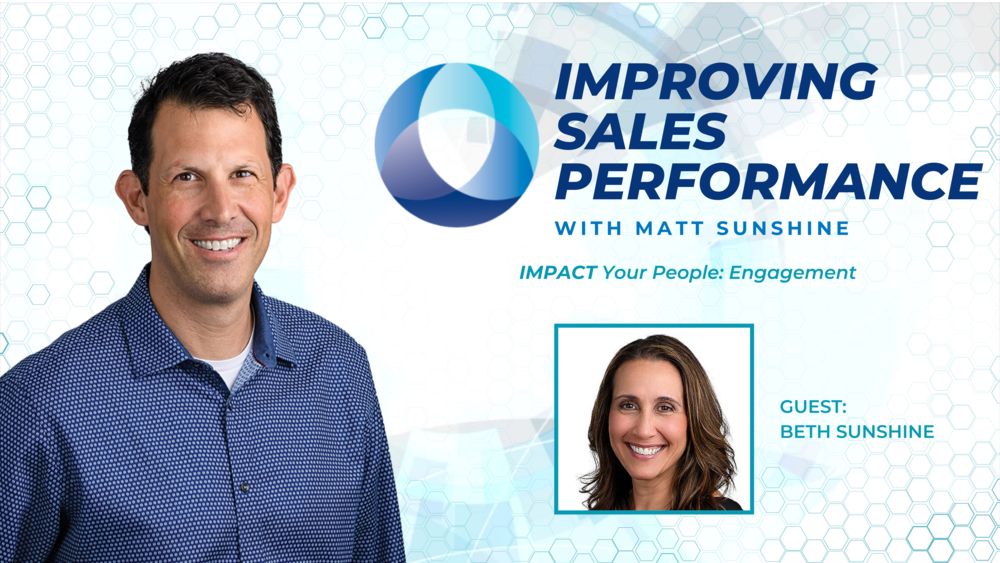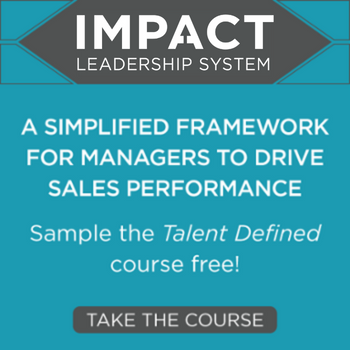
Season 3 of the Improving Sales Performance Series is focused on helping sales leaders make an impact on their sales performance through insight on 4 key areas: people, process, planning, and performance.
In this episode, Beth Sunshine, Partner and VP of Talent Services at The Center for Sales Strategy, discusses how sales leaders can make an impact on their people and teams through employee engagement.
Tune in now to hear the Live broadcast or keep reading for a brief overview.
The Four “P’s” of the Impact Leadership System – People
 The Impact Leadership System is a simplified framework, broken down into the four areas/courses – People, Process, Plan, Performance.
The Impact Leadership System is a simplified framework, broken down into the four areas/courses – People, Process, Plan, Performance.
On previous broadcasts, listeners have heard how the Growth Formula is the founding framework for the People section of the Impact Leadership System. This course was based on giving what we call our Growth Formula more power and structure. It’s about defining talent, but also how that connects to other areas.
Beth explains the Growth Formula as, "A tool that helps us understand how to grow — how to grow as an organization and how to grow individually."
The Growth Formula is (Talent + Fit) x Investment = Growth.
- Talent is the natural ability that we have, even before we add training, skill development, and experience. Talent is who we are; it’s how we are naturally wired. Our talents do not change over time, but we can certainly continue to develop the talents that we do have in order to reach a level of excellence.
- Fit refers to our suitability for the specific responsibilities of a particular job, the company culture, and even the style of the manager.
- Investment is the coach. If you hire people who have the innate talent to be successful and are the right fit for the job, your time spent coaching and developing them will pay off in a big way. You will see that your coaching is the great multiplier.
This formula and information is foundational to the People section of the Impact Leadership System.
What is Employee Engagement ?
Engagement is the last course in the People section of the Impact Leadership System.
With employee engagement and company culture being buzzwords, Matt asks Beth to define employee engagement and explain how a sales leader knows if they have an engaged team.
"We define employee engagement as the emotional commitment and a willingness to give your best at work," explains Beth. "If employees are engaged, they feel as though they have a stake in the game and a sense of purpose. This allows them to want to give their best at work. When they know what they are playing for and understand how they play a part, they are willing to put in the effort to achieve success."
Employee engagement is NOT the same as employee happiness — tune in to hear the perfect example from Beth!
Employee engagement is when we give effort and go the extra mile, and that's what drives results. As a sales leader, how do you know if you have an engaged team? Beth says there are three outcomes that you'll notice with an engaged team:
- Strong employee retention.
- Strong productivity and revenue growth.
- Key account retention.
Are you curious how strong your company's culture of engagement is currently? Download this free Self-Inventory Checklist, and within minutes you'll see how your observations impact your own company's level of employee engagement.
What Has COVID-19 Taught Organizations About Employee Engagement?
There's a direct correlation between employee engagement and hard metrics such as revenue and sales.
COVID taught organizations a lot about the importance of employee engagement. We always knew it was the secret ingredient to business success. However, lockdown and work-from-home mandates made the cracks in culture even more apparent. "Companies that care about their people are always seeking ways to help them," states Beth.
With all of the work that you do to hire people — you want to keep them, and engagement is how you do that. Increasing employee engagement investments by 10% can increase profits by $2,400 per employee, per year.
"Engagement is not fluff — it offers a strong ROI, and knowing what's driving disengagement is important because it helps you develop strategies that will move the needle," explains Beth.
4 Engagement Elevators
Companies that make a substantial investment in employee engagement have 2x the revenue and 4x the average profit of those that don’t.
Researchers have learned that companies with the highest levels of engagement have four things in common, and at Up Your Culture, these are called the Engagement Elevators.
1. Shared Mission
Organizations with highly engaged employees have a clear sense of where they are going as a company and why. Leaders communicate their purpose and vision well enough, and with enough frequency, that each employee, in turn, can clearly articulate the details with others. Employees feel as though they are on a journey together and their shared mission is like a flashing beacon guiding them along the way.
2. People Development
Top managers hire the right people and set them up for success by clearly communicating expectations and providing the right balance of support and autonomy. Managers show that they care about their people, build individualized relationships, transparently share information, coach both strengths and weaknesses, and provide meaningful feedback.
3. Valued Voice
Employees trust their coworkers and leaders, participating in open, two-way communication. They allow others to talk as they sincerely listen and, in turn, they share information and concerns. This allows companies greater insight to avoid problems and also creates a flow of ideas.
4. Earned Trust
Highly engaged employees describe their company as authentic because they are who they say they are. They live their core values, rewarding those who demonstrate them and not tolerating those who don’t. When there is a gap between espoused values and day-to-day actions, companies create mistrust. Trust is fundamental to high performance in a team and high engagement in an organization.
If you're interested in learning more about culture and engagement download Up Your Culture's free Engagement Elevator eBook.
To learn more about the Impact Leadership System and to sample courses, visit css.buzz/Impact.
Don’t miss another episode of the Improving Sales Performance series where Managing Partner Matt Sunshine speaks with thought leaders, experts, and industry gurus, who share their insight, tips, and knowledge on various topics that help companies improve sales performance.
Subscribe to our YouTube channel, and have your notifications on so you’re notified of our next episode!


